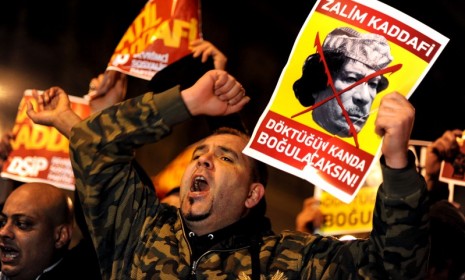Violence in Libya: Should the world intervene?
Forces loyal to Moammar Gadhafi's regime have reportedly killed scores of protesters. What, if anything, should the U.S. and other foreign powers do to stop the violence?

A free daily email with the biggest news stories of the day – and the best features from TheWeek.com
You are now subscribed
Your newsletter sign-up was successful
The United Nations Security Council is meeting in closed session Tuesday to discuss the crisis in Libya, where scores of protesters have reportedly been killed by government forces firing from tanks, helicopter gunships, and fighter jets. U.N. Secretary General Ban Ki-moon condemned attacks on civilians, and Secretary of State Hillary Clinton called on the government of Moammar Gadhafi, who has ruled the North African country for 41 years, to immediately "stop this unacceptable bloodshed." How far should world leaders go to make sure Gadhafi heeds their warnings? (Watch an MSNBC report about Libya's protests)
It is time for foreign intervention: The world has been "challenged to act," says Marc Lynch in Foreign Policy, just as it was "Bosnia or Kosovo, or even Rwanda." That doesn't mean "a direct military intervention," but the U.S. and its allies must go beyond simply condemning Gadhafi. The best bet is a no-fly zone over Libya — at least that way Gadhafi won't be able to "butcher" his opponents using military aircraft.
"Intervening in the Libyan tragedy"
The Week
Escape your echo chamber. Get the facts behind the news, plus analysis from multiple perspectives.

Sign up for The Week's Free Newsletters
From our morning news briefing to a weekly Good News Newsletter, get the best of The Week delivered directly to your inbox.
From our morning news briefing to a weekly Good News Newsletter, get the best of The Week delivered directly to your inbox.
This is not our fight: It's not our place to intervene militarily, says E.D. Kain at Balloon Juice. "I don't wish death on anyone, but this is not our fight, no matter how much we wish we could step in and do something." The Libyan people must "own this revolution," but concerned foreign governments can show whose side they're on by "aiding defecting Libyan troops, setting up border hospitals," and making sure Gadhafi can't cut off protesters from the rest of the world.
The U.S. can't intervene — but maybe Egypt can: Gadhafi won't stop "carpet-bombing" his people because President Obama tells him to, says Allahpundit at Hot Air. And "if we start blowing Libyan jets out of the sky to protect demonstrators," won't we be "obliged to do the same" elsewhere? One alternative might be for neighboring Egypt to enforce a no-fly zone or grant amnesty to defecting Libyan troops. But that's dicey, too, "given the oil interests at play" and the potential for war if Gadhafi holds on.
"Libyan ambassador to U.S. pleads: Say something, Obama"
A free daily email with the biggest news stories of the day – and the best features from TheWeek.com
We can push sanctions and a trial: Gadhafi's own diplomats at the U.N. are begging for intervention, says The Washington Post in an editorial. The U.S. and other governments can start by publicly calling for "regime change," then follow up with "more forceful action," such as U.N. sanctions on Libya's oil industry. And some day, the Gadhafis must be punished in international court for their "crimes against humanity," so other Arab strongmen will know they can't "slaughter their own people with impunity."
-
 ‘Those rights don’t exist to protect criminals’
‘Those rights don’t exist to protect criminals’Instant Opinion Opinion, comment and editorials of the day
-
 Key Bangladesh election returns old guard to power
Key Bangladesh election returns old guard to powerSpeed Read The Bangladesh Nationalist Party claimed a decisive victory
-
 Judge blocks Hegseth from punishing Kelly over video
Judge blocks Hegseth from punishing Kelly over videoSpeed Read Defense Secretary Pete Hegseth pushed for the senator to be demoted over a video in which he reminds military officials they should refuse illegal orders